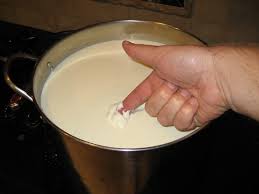
记忆方法
将“coagulate”分解为“co”加上“aggregate”。记住“co”作为前缀意味着“一起”或“共同”,而“aggregate”代表“聚集成群”。所以,想象液体中的微小颗粒(“aggregate”)聚集在一起形成固体(“coagulate”)。这样的图像可以帮助记忆这个单词的含义。
以上内容由AI生成, 仅供参考和借鉴
中文词源
coagulate 凝结
co-,表强调,-ag,做,驱动,见agent.即驱动到一起,凝结。
英语词源
- coagulate (v.)
- early 15c., from Latin coagulatus, past participle of coagulare "to cause to curdle," from cogere "to curdle, collect" (see cogent). Earlier coagule, c. 1400, from Middle French coaguler. Related: Coagulated; coagulating.
权威例句
- 1. As the egg whites cook, they coagulate and rise to the surface.
- 蛋白一煮就会凝结,并且浮起来。
- 2. Blood began to coagulate around the edges of the wound.
- 血液开始在伤口的边缘凝固。
- 3. Most polymer emulsion may coagulate when they enter waste streams.
- 多数聚合物乳浊液在进入废水流时可能凝聚.
- 4. Acid production of lactic acid bacteria is sufficient to coagulate milk proteins.
- 乳酸细菌产生的酸足以使乳蛋白质凝固.
- 5. An agent that causes a liquid or sol to coagulate.
- 胃液中的一种酶,能使乳类凝结.
